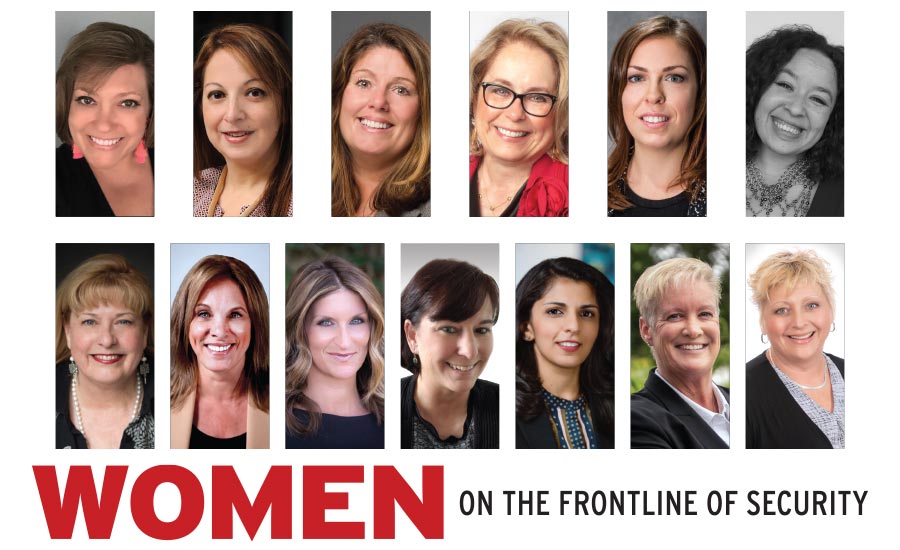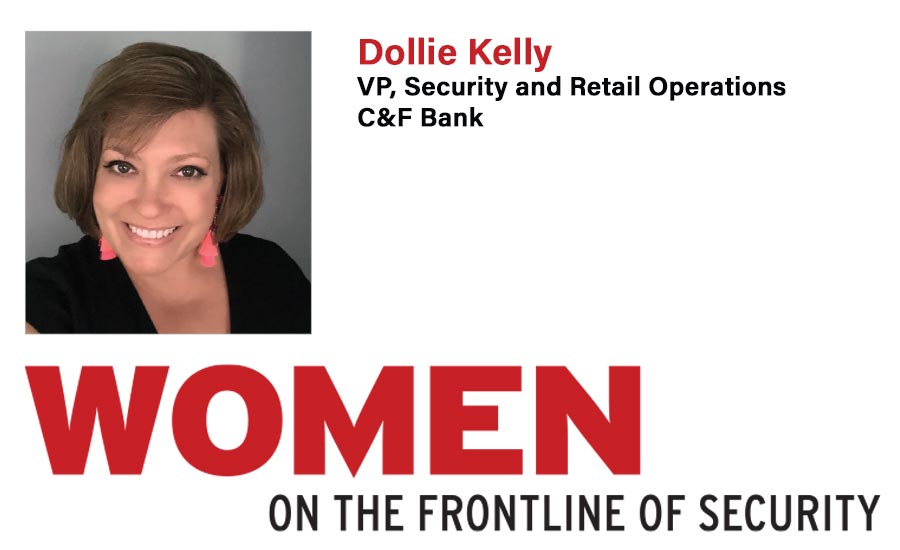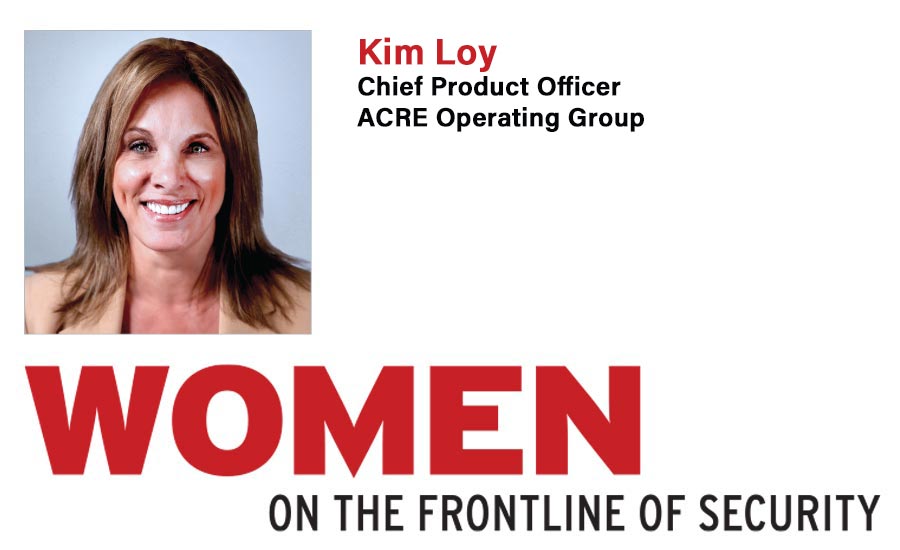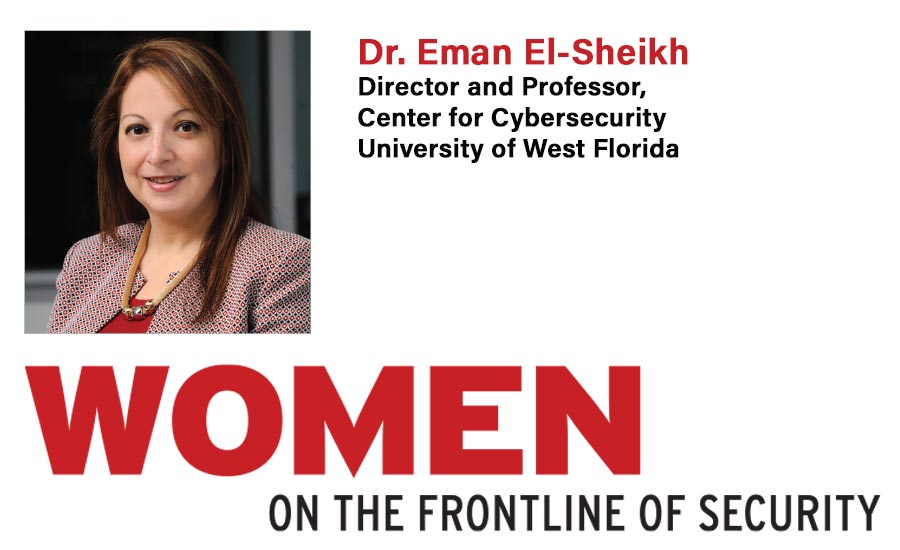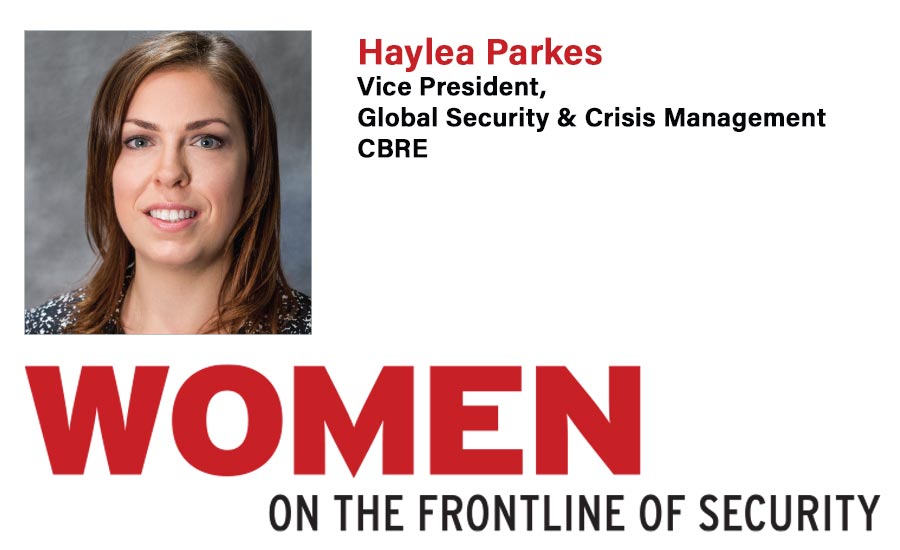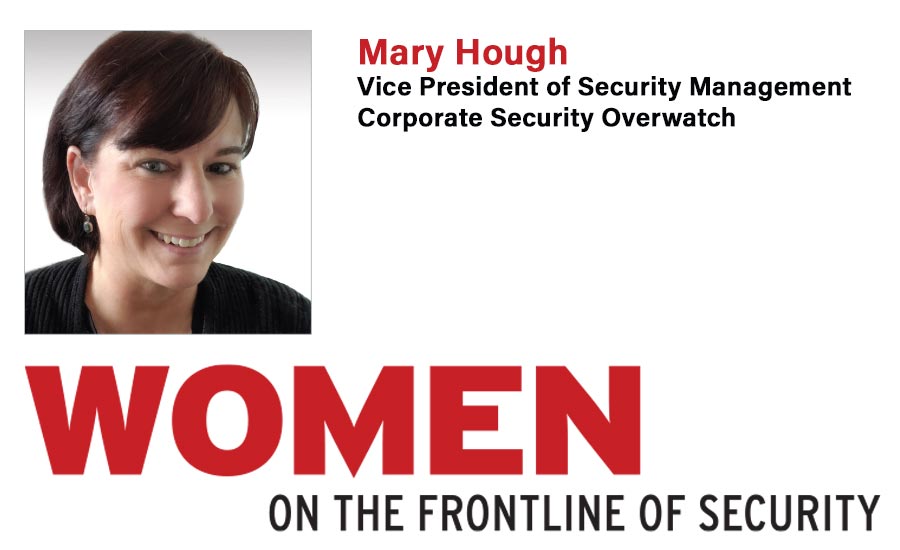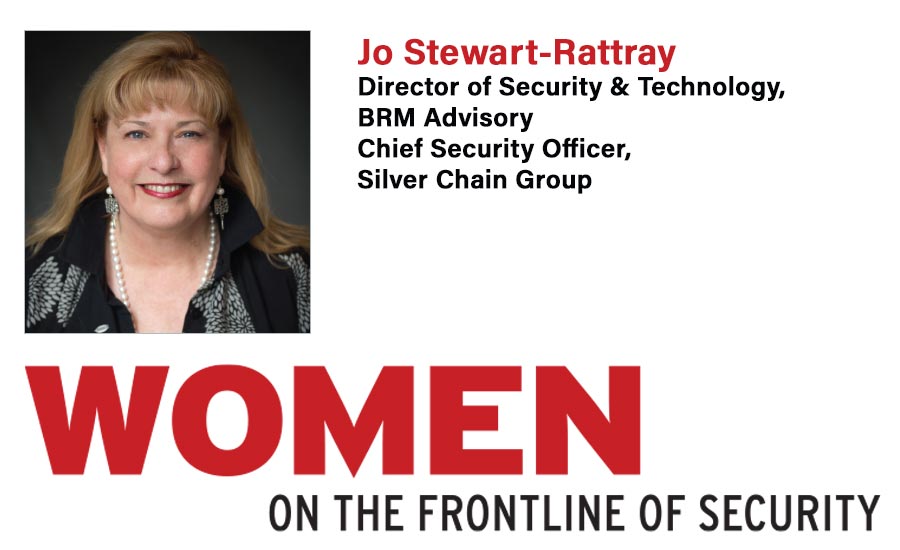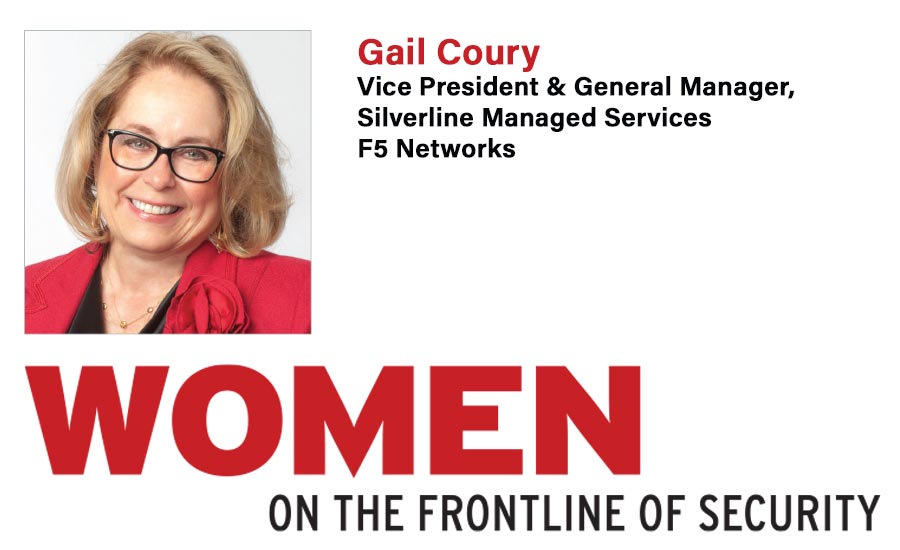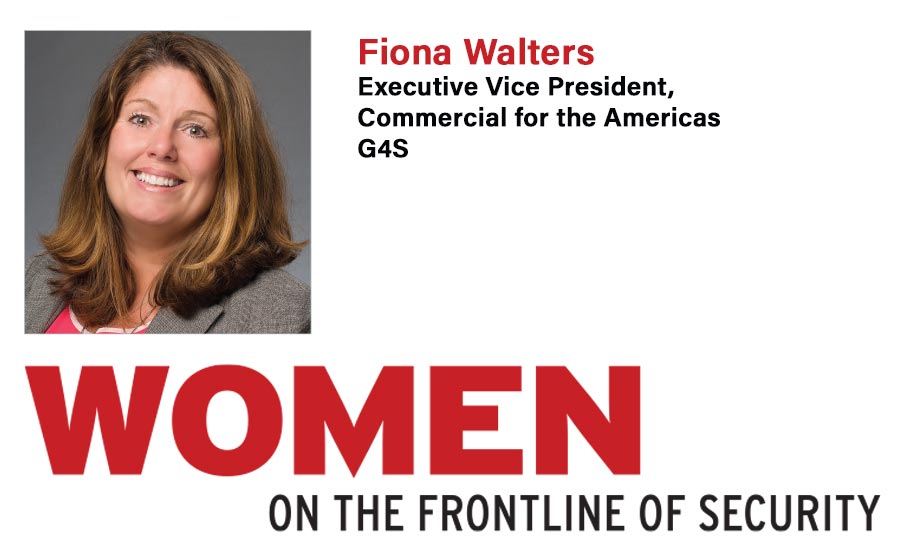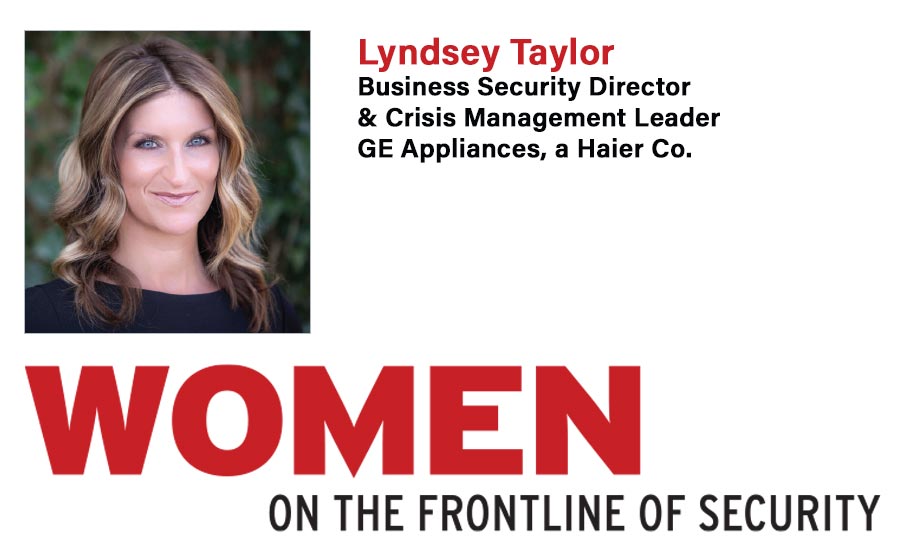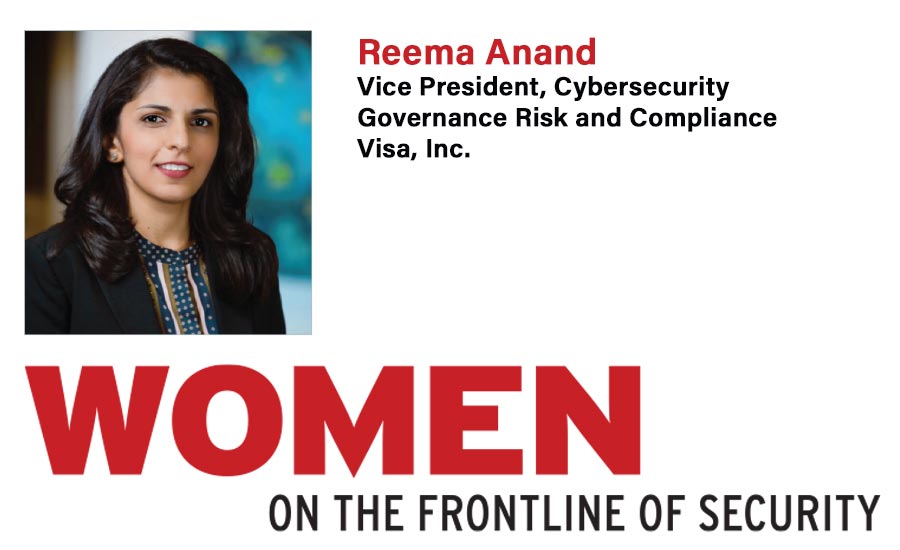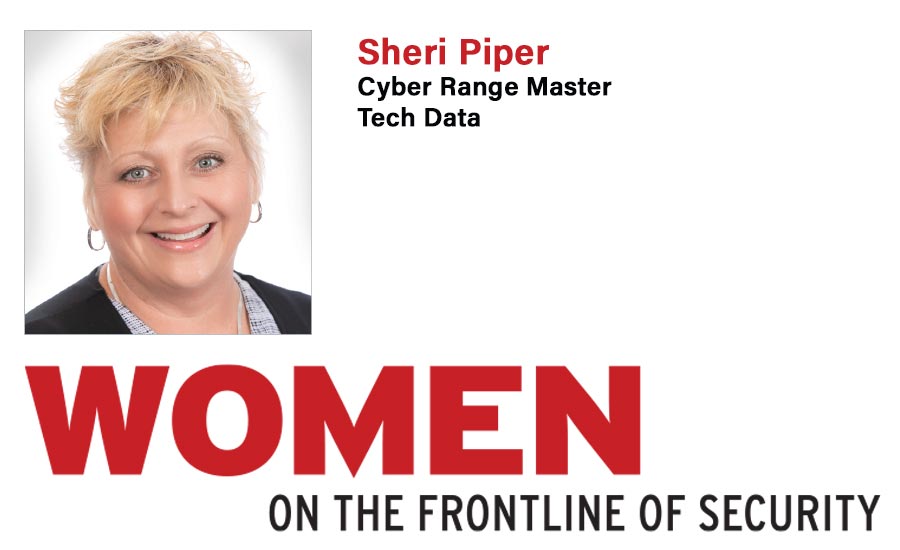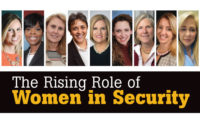Editor’s note: First, we believe it’s important that all public servants should be commended and recognized for their contributions, particularly during the COVID-19 pandemic. So many enterprise security professionals are on the frontlines, in harm’s way without much recognition, and some are risking their lives to provide help, services and expertise. Thank you to all security leaders and first responders!
I had the pleasure to speak with the following 13 female executives who are bound by the same passion: to serve, protect and facilitate public or private safety and security - and all succeeding in security leadership roles:
- Dollie Kelly, Vice President, Security & Retail Operations, C&F Bank
- Kim Loy, Chief Product Officer, ACRE Operating Group
- Dr. Eman El-Sheikh, Director and Professor, Center for Cybersecurity, University of West Florida
- Haylea Parkes, Vice President, Global Security & Crisis Management, CBRE
- Mary Hough, Vice President, Security Management, Corporate Security Overwatch
- Jenai Marinkovic, Chief Security Information Officer & Chief Technology Officer, Tiro Security
- Jo Stewart-Rattray, Director, Information Security & IT Assurance, BRM Advisory and Chief Security Officer, Silver Chain Group
- Gail Coury, Vice President, General Manager, Silverline Managed Services, F5 Networks
- Fiona Walters, Executive Vice President, Commercial, Americas, G4S
- Lyndsey Taylor, Business Security Director & Crisis Management Leader, GE Appliances, a Haier Co.
- Reema Anand, Vice President, Cybersecurity Governance, Risk & Compliance, Visa, Inc.
- Sheri Piper, Cyber Range Master, Security Solutions, Tech Data
- Sandy Chandler, Director, Loss Prevention, Ulta Beauty, Inc.
Dollie Kelly
VP, Security and Retail Operations
C&F Bank
“When I started my banking career, I never dreamed I would become part of the security world,” says Dollie Kelly, who is VP of Security and Retail Operations at C&F Bank, a bank holding company that operates 30 retail bank branches and three commercial loan offices in Virginia. “I moved into a security role because it aligned with the operational roles I was already performing.” At C&F Bank, Kelly is responsible for security, retail operations and business continuity, as well as cyber testing and education.
Kelly is extremely passionate about ensuring the safety and security of C&F Bank employees. She achieves that goal by maintaining a strong employee awareness program around robberies. “When training is repeated over time, a long-term muscle memory is created for that situation, eventually allowing the task to be performed with little to no conscious effort. The body has the ability to go through those motions without taking a long time to pause, to control fear as much as possible and to think about what should be done next, thus allowing our employees to respond in a safe manner, while also ensuring the arrest of the robber or culprits,” she explains.
Much of what Kelly has learned about bank and retail security has come from both male and female mentors that have been in the field for years, some of which are former law enforcement and other leaders who have overseen different functions at the bank, Kelly says. “Because there were many security leaders willing to be my mentors, my transition to security from previous retail-focused roles wasn’t very difficult. Being part of the Virginia Bankers Association, and now a chair of the Security Committee, was instrumental, as well.”
She credits many individuals to her success. Thanks to them, she says, “I’m very passionate about the safety and the protection of others through learning and awareness. We all have a security responsibility, and through recognizing that security is important and reinforcing security with training, we will be the safest that we can be,” she notes.
Even more, through mentoring, Kelly has observed that female leadership in the security industry is more accepted. “By having an equal part of female and male leaders, we broaden the horizon of the thought process for security. It allows us to reach depths that we may not have reached prior due to the single-sex leadership perspective.”
Her advice to anyone, but female executives in particular, is to be yourself. “Know your strengths, your weaknesses and ask for help,” she says. “There are many security leaders who are willing to mentor willing to assist you because we understand security is a shared responsibility. We all want each other to be safe.”
Kelly is co-chair of the Virginia Bankers Association Security and ERM Committee, Girl Scout Leader, a member of Virginia 1st, a member of the Junior Achievement Young Professional’s Board, the Newport News Financial Crimes Task Force and the USSS ID Theft Task Force.
Kim Loy
Chief Product Officer
ACRE Operating Group
Security wasn’t something she had planned for but the job presented itself, and she has never looked back. Kim Loy is Chief Product Officer of ACRE Operating Group, the parent company that owns a number of electronic security system brands. “I love this industry. It’s constantly changing,” she says.
Loy’s past experience includes roles covering product management, marketing communications, R&D and operations in a number of organizations, including; Infographics, GE Security, G4S, Xtralis, DVTEL (now FLIR), Pelco by Schneider Electric and Vanderbilt Industries. In 2018, she moved to ACRE, where she is responsible for oversight of the company’s brands, strategic product planning and cybersecurity strategy. In addition, she provides direction for messaging strategy and communications development.
One thing she loves about security is the constant change. “Technology is always changing. One of the buzzwords now is frictionless access control – being able to enter a building without touching a reader or keypad. Deploying frictionless technology has a number of aspects that need to be considered, including automatic door openers. The constantly changing technology and developments keeps the industry and my role interesting.”
Because security is never stagnant, Loy says, education is critical. “You have to be self-driven to constantly learn new things to stay relevant,” she adds. “It also forces you to persevere, especially as a woman in the industry.”
Thirty-years ago, she often was the “only woman in the room.”
“Now that there are more women in the industry, we have proven that we have the knowledge and the experience to deserve a position in the room. A lot more women are achieving better positions and roles within the organizations that they work for,” she says.
One mentor to Loy was Sandy Jones, a security industry veteran who had a 45-year long career. “Sandy took me under her wing and was successful in helping me get onto the SIA board of directors for my first term back in 2006 when relatively few women held that position.”
The security industry is great for female leadership and offers many opportunities, Loy says. “We bring a different perspective to many positions of leadership. Any woman has the opportunity to move ahead with the right drive and motivation – it’s a great industry to work in.”
Her advice for anyone who is working with a company that isn’t conductive to promoting women is to “find another company. It’s that simple because you’re not going to change the culture of an organization with your driving determination. But in the right organization, that drive and determination will take you as far as you wish to go.”
Outside of her work, Loy serves as a Board Member on the Security Industry Association (SIA) and as the Vice Chair for the SIA Executive Committee.
Dr. Eman El-Sheikh
Director and Professor,
Center for Cybersecurity
University of West Florida
It was at the Center for Cybersecurity at the University of West Florida (UWF) where Dr. Eman El-Sheikh found her calling. “My role here gives me the opportunity to not only advance the field but inspire future generations, as well. I have the opportunity to bring people from across academia, industry and government together to solve big challenges and make a difference by developing best practice cybersecurity education and workforce development programs,” she says.
Dr. El-Sheikh is Director of the Center for Cybersecurity at UWF. She also leads the NSA/DHS National Centers of Academic Excellence in Cybersecurity Regional Hub for the Southeast U.S., where she works to advance best practices in cybersecurity education and prepare the next generation of cybersecurity professionals. The Center for Cybersecurity has received several grants to enhance cybersecurity education and training for K-12, college and non-traditional students.
The field of cybersecurity has taught Dr. El-Sheikh to be bold. “Big challenges require bold solutions. As the cybersecurity threat landscape continues to expand, so does the need for qualified cybersecurity professionals. We need to develop sustainable and scalable programs to overcome the skills gap and workforce deficit to catch up. It’s important to collaborate to resolve the skills gap, too. We’ll never get ahead if we work in silos or reinvent the wheel. We must bring diverse perspectives together and work towards innovative, collaborative solutions.”
Therefore, Dr. El-Sheikh is passionate about helping recruit and advance women in cybersecurity careers. In 2019, she co-founded the Florida Women in Cybersecurity Affiliate to recruit, support and advance women in cybersecurity across the state. “The organization facilitates information sharing, mentoring and networking opportunities for both working professionals as well as students. My hope is that by sharing our experiences, we can inspire younger generations to explore the world of cybersecurity and help others advance their careers,” she explains.
The UWF Center for Cybersecurity has partnered with the Girl Scouts to offer a cybersecurity camp for middle school girls to earn cybersecurity badges. “We need a holistic solution to the cybersecurity skills shortage, and that starts with fostering more interest in science and technology among girls from an early age,” she adds. “We need to serve as role models and encourage more mentoring and professional development opportunities to help more women advance to leadership roles.”
It’s also very important for women in the field to be their own best advocate, Dr. El-Sheikh notes. “Sometimes women will wait until they have the perfect ideas or solutions to contribute. We need to encourage women to step up and take leadership roles, and strive for continuous improvement along the way.”
As part of giving back, Dr. El-Sheikh serves as the higher education representative on the Florida Cybersecurity Task Force, which was established by Florida Governor Ron DeSantis to provide recommendations to enhance the state’s cybersecurity resiliency. She also serves as a peer reviewer for several conferences and organizations, including the editorial board of the Cybersecurity Skills Journal and as a faculty mentor for the UWF AI Research Group.
Haylea Parkes
Vice President, Global Security & Crisis Management
CBRE
Haylea Parkes began her career in Australia, in risk management and business continuity, working in both the public and private sectors at companies such as ANZ, MFS Limited, Ergon Energy and Queensland Urban Utilities.
She then became Global Lead for Business Continuity and Crisis Management at CBRE, a full-service commercial real estate firm that provides solutions to property owners, investors and occupiers. Though Parkes had only been in a security leadership role for three years, she catapulted to the top of the security food chain when CBRE merged internal teams (Business Continuity Management and Global Security teams) in January 2018, she says. As a result, she now leads a Global Security and Crisis Management team.
Her new role, she says, brings different challenges. “Six months ago, for instance, I wouldn’t have imagined that my day would be entirely focused around pandemic response or virus response. In the past few months in responding to this pandemic, I’ve learned that security is a team sport. There is so much value in having diversity and a variety of perspectives in a team to get a 360-view of security.”
Parkes is part of a structured mentorship program at CBRE, which helps her understand how to become a better mentor. “It’s not only a good way to contribute back to the company, but also an opportunity for me to develop professionally to become a better mentor going forward.”
To be exposed to different viewpoints and others in the industry, she likes to attend as many conferences and networking events as possible. Over the years, she has seen more female leaders being recognized for their expertise. “It’s been great to see that evolution. More women are being given opportunities to excel in leadership positions, even if they are not from traditional security backgrounds, like myself.”
Parkes notes that evolution means that even if female executives don’t have a strong background in security, there are many opportunities to learn from other security leaders. “We have the ability to manage and lead a successful and effective team in this space,” she says. “It’s important for current security leaders to allow those with limited experience to succeed and grow within their roles. But it’s critical for women to not be intimidated and to ask for help to be more educated about the role of enterprise security.”
“I came to my current role with a new perspective, and I’ve only been in the security space for three years,” Parkes adds. “I admit, at first it was daunting, but I had the support of my mentors and a really strong team, so I was able to learn from them. If you feel like you don’t fit the profile of a typical security leader, seek opportunities to learn from mentors, and mentor colleagues, as well. Take on new responsibilities, even if they are outside of your comfort zone, because that’s how you grow and expand.”
Mary Hough, CPP
Vice President of Security Management
Corporate Security Overwatch
Mary Hough got her start in security in the form of a summer opportunity at BlueCross BlueShield – and that summer job lasted 15 years, she jokes.
Throughout her career at BlueCross, as Regional Security Manager at William Wrigley Jr. Co., Director of Security at the University of Chicago and Global Security Director at Navistar Inc., Hough has honed her risk management, corporate security and emergency preparedness skills. She has managed myriad of security teams and officers, developed emergency safety and workplace violence programs and established risk management tools.
Recently, Hough was named VP of Security Management at Corporate Security Overwatch. “Randy Kincaid, my BlueCross mentor, formed the company to combine everything that we’ve always talked about as a group,” she explains. “We will provide security services to companies and organizations that cannot afford to have a full-time experienced security professional on staff.”
“During this pandemic, everybody needs resiliency because they weren’t very proactive, and now they’re reactive,” she adds. “Everyone is trying to figure out how to get their businesses back up and running.”
Being proactive instead of reactive is a valuable skill Hough has learned throughout her career. “Being reactive in this business can cost a lot of money. The pandemic started and people were not prepared with the right pandemic processes in place. Now, people are asking, ‘What is the best way to get our people back in our building?’ Or ‘How do we get anywhere from 50 to 2,000 people back in a manufacturing plant’? Or, ‘Do I hire 20 guards and have everyone take their temperatures?’ If they would have invested in a business continuity plan that included a pandemic response, they would only be adjusting a few things and not reinventing the entire wheel,” she notes.
Hough has always had a passion to build and champion individuals in the security industry. “It doesn’t matter if you’re a man or a woman in this business – it’s about skills and experience. However, as women, there are unique situations that we come across as security professionals. So we should always aspire to build each other up, instead of tearing each other down.”
At times, it’s easy to get discouraged and doubt your abilities as a female executive in the industry, she claims. “We are often outnumbered in a room of people who are all subject matter experts. My advice? Join female leadership groups, keep up with security trends, stay in touch with fellow colleagues and don’t isolate yourself within the industry,” she says. “Make sure you can speak at an educated level with confidence. Bring a proactive voice to your company and help establish an effective security program.”
In her free time, Hough is active in female leadership groups, both in the ASIS and OSAC Women in Security, and is an active member of the FBI Chicago Citizens Academy, which focuses on community relations.
Jenai Marinkovic
Chief Information Security Officer, Chief Technology Officer
Tiro Security
“I’ve been fortunate in my career to have been guided by brilliant mentors who inspired me to transcend boundaries, empowered me to fail, and helped me hone creativity and vision into a singular core purpose. Purpose-based leadership helped open the doors to work in the cybersecurity sector and expand into areas such as futurism, innovation, experimentation and engineering,” says Jenai Marinkovic, CISO and CTO of Tiro Security.
Marinkovic’s career is impressive. For more than 20 years, she has been establishing information security programs, including security architecture, design, and engineering programs, global cyber defense and forensics teams. Marinkovic has been responsible for enterprise and converged security functions, including digital and physical security, business continuity, crisis management, compliance, and more. She has held upper management and executive roles at Beckman Coulter, Zenith Insurance, DirectTV, Beyond and Tiro Security. She sits on the Technology Advisory boards for Beyond and Kmute.
Now, as a CISO and CTO, Marinkovic provides on-demand services to Tiro Security clients, including cybersecurity and technology strategy and design, security and tech risk management, organizational governance, audit and compliance, capability performance management and maturity assessments, defense and forensics.
Cybersecurity is the fastest moving industry in the world, believes Marinkovic, who is also a cybersecurity subject matter expert for ISACA. “There’s something magical about what’s happening with technology, as we enter the ‘Fourth Industrial Revolution,’ a time marked by the intersection of biological, physical and digital worlds. When this happens, the conditions are optimal for events called “Big Bang Disruptions.” We will see disruptive creations that tear down and build up new product lines and technology, overnight,” she explains. “Security has to operate within all of those worlds. Given the enormity of all changes that we’re facing, there’s always an opportunity for security leaders to work within those “bleeding edges,” and think outside of and work with emerging technologies.”
Security gets to take advantage of these innovations to build security capabilities to better protect assets, infrastructure and individuals, Marinkovic claims. “These disruptive forces will trigger the rapid change of business processes and product lines, forcing security groups to adapt. Adaptation and evolution teach failure, which teaches resilience. The world of security is all about learning from failure – how to harness the power of failure, fail fast, fail forward, and use those learnings to better the world around you. Becoming an executive means mastering failure resilience.”
Marinkovic notes that women are having difficulty breaking into the field. “Due to the risks that companies face, they often feel they must hire people who already have experience.” She believes we must work together to help get more women into the field and build the leadership pipelines to get them prepared for middle management or senior leadership roles. “All leaders in the industry must commit to mentoring and supporting apprenticeships now. We need to provide women new to or recently entering the industry more hands-on client-facing experience, enabling them to get hired and ultimately become the CISOs of tomorrow.”
In her free time, Marinkovic likes to farm on her family’s ranch. She competes in medieval heavy weapons fighting and has been studying ancient and medieval medicine for the past ten years.
Jo Stewart-Rattray
Director of Security & Technology, BRM Advisory
Chief Security Officer,
Silver Chain Group
In the 25 years she’s been in the security and technology industry, Jo Stewart-Rattray has progressed through the ranks to become a Chief Information Officer in the electricity and tourism sectors in Australia, Director of Information Security and Manager of many other strong companies. Currently, Stewart-Rattray is Director of Information Security & IT Assurance for BRM Advisory, where she assists companies with guidance on information security and governance, including compliance, audit and awareness.
In addition, as CSO at Silver Chain, a not-for-profit organization delivering community health and care services across Australia, she’s helping build a strong security stance. “And it’s certainly been a challenge given that we are in the middle of a pandemic. All of a sudden, we had to enable hundreds of employees to work remotely from their homes,” she notes. “We had to find new and secure ways for nurse practitioners and nurse clinicians to be able to share and receive sensitive information while on the road, as well.”
Despite past and current challenges, Stewart-Rattray says her career has been rewarding as she has had opportunities to work across industry sectors and to work with talented people. Her approach is to be collaborative. “Security is about collaboration, it’s about listening. Listen to what your clients want before saying no. Take a cross-organizational approach that is not just about cybersecurity – this is about securing information from cradle to grave. Having a successful cyber strategy is to ensure that we do everything in our power and utilize every resource to safeguard the information that we are trusted to protect.”
Currently, Stewart-Rattray is in the process of mentoring two women, who are incredibly capable and talented, she says. “To see them grow is not only a great journey for them, but for me as well. It really is a two-way street. I learn as much from my protégés, as I hope they learn from me.”
To help drive the idea that women can learn from each other, she was the founding Chair of ISACA’s Women Leadership Advisory Council and helped spearhead the SheLeadsTech initiative. “It’s simple,” she says, “there aren’t enough women in the security and technology businesses, so the SheLeadsTech program was developed in order to assist, end and examine the under-representation of women in the tech workforce. It’s been helpful for many women who aspire to leadership roles and want to take steps to the corporate ladder.”
When she finishes her career in the years to come, Stewart-Rattray would like to believe she has left a legacy of encouraging young women to step up “because we need to see a more equitable face of security,” she says. “Women do bring amazing talents and different viewpoints to security, so we need to work on encouraging and supporting women in the security industry.”
Stewart-Rattray lives in the beautiful Clare Valley in South Australia one of Australia’s premium wine-growing districts. Her family owns a small vineyard, so she likes to spend time outside, with her husband and dogs. She also owns various micro-businesses, centered around canning and jelly making, beading necklaces using semi-precious stones and Japanese silk-dyeing.
Gail Coury
Vice President & General Manager,
Silverline Managed Services
F5 Networks
“Solving security problems for different industries is always a challenge because each vertical has its own security basic foundational risk and controls, applied consistently across all businesses. But in the four decades I’ve been solving security challenges, I have never stopped having fun,” says Gail Coury, VP and General Manager of Silverline Managed Services at F5 Networks – a transnational company that specializes in application services and application delivery networking.
Coury is an experienced security executive, who has led information security infrastructure systems and network management operations, security technical consulting, information systems auditing and programming. She has been involved in a wide range of industries, including technology, airline reservation systems, insurance, banking and retail. Prior to her current role at F5, Coury led the information security function for Oracle Cloud globally, which includes SaaS, PaaS, IaaS and Managed Cloud services. She has also been CISO for PeopleSoft and for J.D. Edwards.
As an accomplished executive, she feels it’s important to give back and pay back all the blessings she’s had in her career by helping women progress into leadership roles. At Oracle, Coury was a community leader of the Women’s Leadership group, where she provided mentorship and guidance to up-and-coming leaders at Oracle. She is an active member of ISACA and has participated in both the Women’s Leadership Council and SheLeadsTech program, as well as the formation of ISACA’s philanthropic strategy. She now serves as board chair for ISACA’s One In Tech foundation.
“As women in this space, it’s important to ask ourselves: What can we do, and how can help try to drive women forward? Women need role models to help them gain enough confidence to go through their own development process and for leaders to encourage them and inspire them,” she says. “We need to know there is a place where we can talk, network and have the opportunity to grow and learn together, while also balancing the playing field for everyone.”
“Most women are like me - they never thought about computer science or development or computer engineering as a career option,” she adds, “But security is fun and challenging. The threat landscape always evolves; therefore, security isn’t a job that you’ll ever be finished with.”
Fifteen years ago, Coury notes, security was an IT problem. “Today many organizations are embarking upon digital transformation and in doing so, securely interacting with their customers is of critical importance in maintaining their confidence and loyalty. The role of security in enabling the business has really grown, which in turn has enabled a security leader to become an integral part of the company and the company’s strategy,” she says.
“Now, security is at the top of the mind for boards,” Coury notes. “They want to understand the risk associated with the way that services are being delivered to customers, and whether security has enabled those services to be done in a way that is within the risk tolerance of the company or the organization.”
Fiona Walters
Executive Vice President, Commercial for the Americas
G4S
Fiona Walters has been with G4S since 1992. There, she has been instrumental in the successful start-up of several service lines in the UK and the US. She successfully ran G4S businesses in the Care & Justice sector prior to taking on broader responsibilities covering all security sectors.
As EVP, Commercial, Walters is responsible for business development, Americas outbound sales and G4S’ U.S. Embassy global program. Her business development responsibilities include improving sales, operations and performance, and working with all G4S’s Americas countries and businesses to build, implement and integrate their strategic sales plans, ensuring the businesses meet their sales goals and drive the integrated solutions strategy. With her team, she is responsible for quality, consistency, contractual compliance and operational performance for embassy security programs in more than 40 countries.
“I got started in security back in the early 90s, but it was my father, a senior police officer, who created a foundation for me to see how important safety and security is to society. We help make society safer. We help customers protect their most important assets and people.”
She works with a great team, she notes, who truly values people and customers and getting it right. “We are not just selling a product. We are helping drive value for a customer and helping protect people, employees, critical infrastructure and whatever happens to be an asset. Security is meaningful, not menial work.”
Security professionals, she claims, are also often overlooked by society. “They do remarkable things every single day. We should never underestimate what somebody is capable of. We’ve got frontline workers who are saving lives every day, who are engaged in various challenging environments during this global pandemic, to ensure that people are protected.”
While the industry overall, Walters says, is male-oriented, “there are more women coming into the security industry and the quality of their leadership and knowledge is really high. They deserve the roles they are in.”
It’s critical for those already established in the industry to step into a mentoring role, she says. “It’s really important for us to enlist high performing talent in the industry and help them grow. It’s critical for us to communicate often and offer a perspective of what it’s like to be a leader in the industry. Having a good mix, male or female and minorities, adds different perspectives and adds value to security operations.”
In her free time, Walters enjoys spending time with family, traveling to different parts of the world to expand her mind and open it to different perspectives, as well as staying updated on global trends that may impact her duties at G4S. Walters and her team members also volunteer with Habitat for Humanity, among other charities supported by G4S.
Lyndsey Taylor
Business Security Director & Crisis Management Leader
GE Appliances, a Haier Co.
“From a very young age, I knew I always wanted to be in the world of law enforcement. I always had this inner desire to serve and protect,” says Lyndsey Taylor, Business Security Director and Crisis Management Leader at GE Appliances, a Haier Co.
After obtaining a degree in Police Administration and then a masters in Criminal Justice, Taylor became a Special Agent with the U.S. Secret Service, specializing as a Network Intrusion Agent and then as manager for the Kentucky’s Secret Service Electronic Crimes Task Force.
After nine years, she transitioned to the private sector, as Global Security Manager of Investigations and Executive Protection at Humana. Her first assignment in the private sector was to secure a mobile well-being display in New York City’s Central Park, Taylor says. “I threw all resources into the event, just like we would at the Secret Service. I had armed officers overnight and barricades. My boss looked at me and said, ‘What is the problem statement, and what are you trying to secure?’ That’s when I realized there’s a balance, and there’s risk that you have to be willing to assume. Mitigate what you can and balance the risk based on the likelihood of an incident occurring.”
After Humana, Taylor moved on to GE Appliances, first as Sr. Security Manager, and then into her current role in 2015, leading security and crisis management for the entire business. Taylor holds global responsibility and oversight of all business, facility, people, property and travel security programs. These include emergency preparedness, crisis management, journey management, investigations, workplace violence prevention, asset protection, loss prevention, executive protection, special event planning and business continuity planning.
Taylor has had the pleasure of mentoring several colleagues. “I never make it a purpose to just recruit for security. My goal with each mentee is to become an advocate for them internally within this company, or externally, because my goal and my job as a mentor is to be a servant to them.”
Personally, Taylor feels there’s simply not enough women in the security space. “Women, and all diverse individuals, bring a different narrative and perspective to security. My advice is – and this applies to anyone in the industry – understand that security is a customer service organization. You are a servant leader. Your main priority is to be a great partner and active listener, to be humble and to build those relationships that enable the success of your business and customer.”
Taylor is an advocate for veterans and military personnel. She co-loads the Veterans Network at GE Appliances, helping to build the programs to support their recruitment, transition and retention into the private sector. Currently, she’s co-leading the COVID-19 Crisis Response Business Continuity team.
Reema Anand
Vice President, Cybersecurity Governance Risk and Compliance
Visa, Inc.
As a VP of Cybersecurity Governance Risk and Compliance, Reema Anand oversees a variety of critical functions, including the creation of enterprise security controls and policies to address the changing threat and regulatory landscape; managing emerging risks from third-party vendors and partners; ensuring compliance with internal and external audits and regulatory requirements; performing security due diligence and governance reporting for Visa M&As; and overseeing the remediation assurance process for cybersecurity vulnerabilities and findings.
Anand also leads the executive and board reporting data functions that enables Executive Management decision-making through reporting of cyber metrics and strategic initiatives.
Prior to joining Visa in April 2019, she was a Managing Director with KPMG LLP Risk Advisory for 15 years. She served as the Silicon Valley Corporate Social Responsibility Leader in charge of leading various diversity and inclusion initiatives.
“I owe a large part of my success and career development to my mentors,” she says. “When I first joined the Visa team, I sought out my mentors and other leaders who had been in the financial and payments sector, and they guided me in understanding the dynamics of this space.”
Cybersecurity is a priority for her and the Visa team, Anand claims. “I love that I get an array of challenges in this space, so I get to apply everything I’ve learned over the past 16 years to make an impact in our communities and the world we live in. We are enabling the safe and secure movement of money in a digital payment space – it is no small task.”
Cybersecurity has taught her to plan for the unexpected, she notes. “Security really is a never-ending job, and every day brings a set of challenges, as well as opportunities to be trusted business partners. We have to strategize to think in a long-term perspective about how we want to shape the future to be able to respond to the next emergency. As security leaders, we cannot afford to wait for a five-year plan or a six-month plan. We have to drive that sense of urgency within the team and drive prioritization and response efforts. At the same time, we need to be an enabler of innovation and growth. Striking that balance and finding your voice can certainly feel like an art at times. What helps is continuous learning and diversity of thought leadership.”
“Shaping the future will largely depend on how the security industry grooms the next generation of leaders, particularly women in the security space. Although more women are in leadership roles, not just middle management, there’s still a long way to go. Women need more role models within their companies. We have to create opportunities for women to continue to learn from and thrive.”
“Something I encourage my counselees to do is to be confident in their own abilities and expertise,” Anand says. “Find mentors and build long-lasting relationships with them. Mentorship brings immeasurable value to one’s own career and personal development.”
Sheri Piper
Cyber Range Master
Tech Data
Although Sheri Piper’s security career has been short, she has always had the right personality and attitude for cybersecurity, she says. She has gained a diverse working background of experience that includes emergency services, healthcare services, quality assurance, finance, hospitality and retail, as well as being a former entrepreneur.
Piper is a Cyber Range Master at Tech Data, where she oversees day-to-day operations to ensure operational continuity of the business, provide cybersecurity excellence and assist in providing opportunities for learning and training for the cyber range. Prior to Tech Data, Piper worked at ACTRA as Logistics Coordinator and member of the IT Security Team.
The security space has taught her the importance of working in teams, she says. “No one can be successful all by themselves. In the cybersecurity space, we must partner and fight to defend adversaries together. When we try to do it alone, it creates silos. We have a better success rate if we work together.”
Throughout her career, Piper notes, mentors have played a key role. “Mentors are a necessity in the security industry. If we’re not sharing and teaching others, we can’t continue to learn. Most importantly, we can’t succeed in defending against cyberattacks.”
The security industry, she says, can benefit from more mentorship opportunities for women who are looking to obtain middle management and senior leadership roles. “Women can be strong assets to the industry and to the security space. We are great listeners, great problem solvers, and we often think outside of the box. It’s important to find a mentor, a partner, or peers that are willing to help, teach you and support your passion for security.”
The security industry needs passionate leaders to solve complex problems and come up with new trends that enable business, she says. “What’s important is that we make ourselves available to learn new things, be flexible and adaptable to changing environments. It’s critical that we are not afraid to ask for help and seek opportunities to learn.”
Piper is an advocate and a volunteer for the National Cyber Warfare Foundation, a nonprofit created in 2012, which focuses on reducing the cybersecurity skills gap in America. “We’re upskilling talent from young kids to college students to adults. They are never too young or too old to learn about what safety and security means in business.”
Sandy Chandler,
CPP, LPC, CFI
Director, Loss Prevention
Ulta Beauty, Inc.
“I got started in security doing uniformed security overnight. Within a year, I was given the opportunity to apply for an undercover security role as a loss prevention detective for a major department store chain,” says Sandy Chandler, CPP, LPC, CFI, Director of Loss Prevention at Ulta Beauty, Inc., an American chain of beauty stores, headquartered in Bolingbrook, Ill.
Thanks to her passion for loss prevention and asset protection, Chandler quickly progressed into leadership roles at various companies, such as Gap, Inc., Whitehall Jewelers, Inc., Follett Higher Education Group, Rite Aid and Bloomingdale’s. She has developed a reputation for being the “go-to” person and an industry leader in asset protection, talent development, investigations, ORC, addressing disruptive behavior, and training staff on how to handle violent and active shooter situations, she says.
At Ulta, Chandler supervises a Regional Loss Prevention Manager and a Team of Area Loss Prevention Managers within California. “The primary part of our role is to make sure that stores are safe, secure and profitable, while ensuring the best possible guest experience. As we navigate COVID-19 and how to transition to a new normal, we have made the safety of our associates our top priority. We have conducted training of stores to give associates the support and resources they need to work safe and bring the best shopping experience to guests in our stores.”
Chandler is passionate about the training and development of people. “I enjoy putting together pieces of a puzzle, investigations and the different challenges that present to us as we develop programs with our cross-functional partners and participate in projects to address those challenges.”
“The challenges COVID-19 have presented to security are formidable. But change is constant, and businesses move at light speed and must constantly adapt. You must learn to quickly adapt with the ever-changing business. Be strategic, identify potential risks, execute your plans, measure your results and fully understand, embrace and align with your company’s culture while speaking to your own core values,” she says.
Her mentors have played a key role in her career development and professionalism. “I’ve been mentored by several great leaders in the industry, such as Frank Hopkins, Jesse Stanley, Ted Dulles, Chad McIntosh and Bob Oberosler. I’ve learned so much from them on how to be strategic, make a difference in other’s lives, be innovative, be passionate about what you do and how to take calculated risks in order to drive results.”
Through mentorship and industry networking, she claims, women can be inspired to join security roles. “We need a lot more diversity and female leadership. To be successful in this space, we have to support each other’s advancement. My advice to women leaders is to not shy away from opportunities. You must get out of your comfort zone in order to grow. It’s critical to never stop learning, to be open to feedback, as well as to volunteer for cross-functional projects to get more exposure within your company and others."
Chandler is also a board member of the Coalition of Law Enforcement and Retail.
